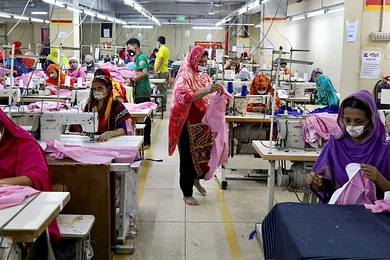US brands for urgent action on RMG wages
Leading US clothing brands have written to the Bangladesh government recommending a hike in minimum wages for readymade (RMG) garment workers, to a figure that are sufficient to cover basic needs, provide discretionary income, and takes into account inflationary pressure.
To review the wages, these brands believe that consultations should be inclusive and include all relevant stakeholders, including a constructive dialogue among labour groups and trade unions.
Fifteen US-based apparel brands jointly sent the letter to the Bangladesh government on October 13, and a copy of the document can be found on the American Apparel and Footwear Association (AAFA) web portal.
These brands are Adidas, Gap Inc, Under Armour, Patagonia, Burton, Hugo Boss, Abercrombie & Fitch, Amer Sports, AEO Inc, Levi Strauss & Co, Lululemon, SanMar, KMD Brands, PVH Corp and Puma.
The undersigned companies urged a successful conclusion to ongoing negotiations under the minimum wage review mechanism that incorporates the views of all stakeholders, and reflects the economic realities in Bangladesh.
The letter read, “We acknowledge that apparel brands and retailers sourcing in Bangladesh have a role to play in enabling the above recommendations. We are committed to implementing responsible purchasing practices to fulfill that role.
“We note that the average monthly net wages for garment workers in Bangladesh has not been adjusted since 2019, while inflation has increased significantly over that time. We continue to recommend that the government of Bangladesh adopt an annual minimum wage review mechanism to keep up with changing macroeconomic factors.”
On April 9 this year, the government formed a six-member wage board for RMG workers, headed by senior district judge Liaquat Ali Mollah.
The board’s six months tenure already expired, and it received multiple extensions. But it has yet to put forward any proposal for the new wage structure for nearly four million RMG workers across the country.
This board’s fourth meeting is scheduled to be held on October 22 in the capital, and the chairman has asked both the RMG owners and workers’ representatives to submit their wage proposals there.
Workers and the trade unions of the RMG sector are demanding Tk 23,000 monthly minimum wages, while the apparel makers plan to propose Tk 9,000. If they propose this figure, it will be lower than the 2018 wage structure when comparing USD rates.
Bangladesh had fixed $100 or Tk 8,000 in 2018 as monthly wages for RMG workers. Due to depreciation of the local currency, the wages now amount to $74.5 per month, show central bank data.
An analysis of wages paid by different RMG exporter nations show that Bangladesh pays one of the lowest monthly wages to its RMG workers. China pays a minimum $161 in RMG worker wages, while India pays $165, Vietnam $191, Pakistan $110, and Cambodia $200.
In their letter, the US brands said, “The government can play an important role in facilitating new union registration, condemning violence, threats, or intimidation against union members, and overall fostering an environment that respects workers’ collective bargaining rights and empowers them as essential stakeholders in the nation’s progress.
“We strongly urge the government to ensure that there is no retaliation against participants both during and after the minimum wage review to foster and promote an atmosphere of open dialogue and inclusivity through the minimum wage negotiations, and beyond.”

























